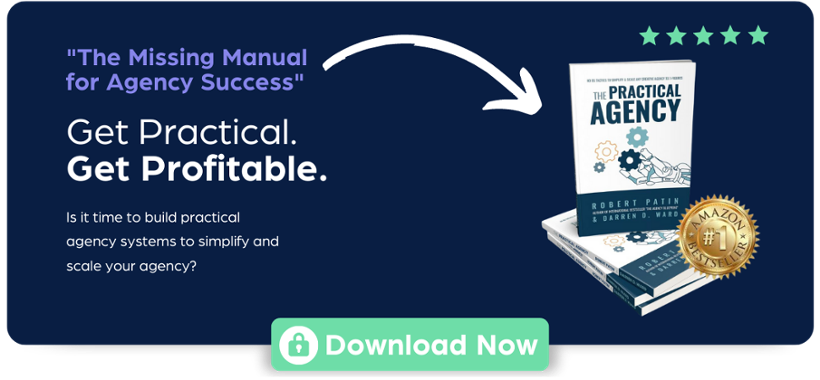
Transforming Sales Challenges into Growth With Podcasts
In the fast-paced world of creative agencies, time is a currency you can't afford to waste. Many agency owners find themselves weighed down by discovery calls that often lead to dead ends, consuming hours that could be better spent on fruitful engagements. It's a familiar cycle: investing time and effort, yet struggling to connect with the right leads.
Enter the power of podcasting - a channel that offers a refreshing divergence from traditional lead generation methods. When your leads come from a podcast audience, they're further down your funnel off the bat. They've already been introduced to your brand and your service, arriving as warmer, more qualified prospects. This shift ensures your time is spent with leads that are more likely to convert.
By leaning into podcasts as a lead source, you're not just broadcasting your message—you're cultivating a stream of high-quality leads, primed and ready to engage with your agency.
Why Podcasting Needs To Be Part of Your Agency’s Marketing Strategy
Embracing podcasting as a marketing tool can revolutionize how you connect with potential clients. It's more than just sharing information; it's about giving your brand a voice and personality that can really resonate with your audience.
Podcast appearances build your credibility as an industry expert and offer a glimpse into what working with your agency is like. It's an opportunity to stand out in a crowded market and forge a deeper connection with your audience.
Podcasting should be a key component of your marketing strategy because they:
- Allow you to showcase the real, unfiltered voice of your agency. Sharing stories, insights, and experiences that resonate on a personal level builds trust with your audience and makes your agency feel more approachable and authentic.
- Showcase your expertise that may not organically arise during the sales process. Discuss industry trends, creative strategies, and case studies to reinforce your agency's knowledge and position yourselves as thought leaders in your field.
- Provide networking and collaboration opportunities with industry experts, clients, or fellow professionals, which not only enriches your content but also sparks valuable relationships that could lead to future business ventures.
- Enhance your agency’s SEO and online presence by providing fresh content for your website and social media channels, enhancing your SEO efforts and making it easier for new clients to discover your agency.
- Are low-cost compared to other marketing strategies, while still reaching a broad audience. The initial investment in quality recording equipment is quickly offset by the ability to produce multiple episodes without incurring the recurring costs associated with traditional ad campaigns.
- Cultivate a sales pipeline by providing the opportunity to engage with listeners, cultivating a loyal following. This sense of community not only fosters brand loyalty but also turns listeners into brand advocates who are more likely to refer others to your services.
4 Tips To Maximizing Your Impact on Podcasts
First impressions are crucial, especially when you're representing your creative agency on a podcast. The right approach can significantly boost your impact and leave a lasting impression on your audience.
Here's how to prepare effectively and make every podcast appearance count:
1. Selecting the Right Podcasts:

Your podcast appearances should align with platforms that resonate with your agency's expertise and target audience. This ensures your message reaches those who will find it most valuable.
Not sure where to start? Start with:
- Choosing podcasts focusing on marketing, branding, or design to align with your agency's strengths.
- Opting for podcasts whose audience matches your ideal client profile, ensuring relevancy and engagement.
- Seeking collaborations where your insights add value without overlapping with the host's content.
2. Crafting Your Unique Message:
Remember, what's obvious to you can be a revelation for others, so share content that reflects your unique journey and insights.
This could look like:
- Sharing the evolution of your agency, including challenges and milestones.
- Discussing specific examples where your agency significantly impacted, showcasing your problem-solving abilities.
- Offering your perspective on current trends for listeners looking to stay informed.
3. Preparing for Your Podcast Appearance:
Preparation is key to delivering a focused and engaging message. Make sure to:
- Know your key messages. Identify the main ideas you want to convey to keep your message coherent.
- Practice weaving your experiences into engaging stories to make your content relatable and memorable.
- Familiarize yourself with the podcast’s format and audience, and prepare for common questions.
By strategically selecting the right podcasts, crafting a message that showcases your expertise, and thoroughly preparing for each appearance, you can leverage podcasts as a powerful tool to grow your agency's reputation and reach.
4 Steps To Getting Your Podcast in Front of Your Target Audience
You've just recorded what could be the best podcast episode in your agency's history. It's insightful, engaging, and packed with value. But here's the kicker – it's only as good as the number of ears it reaches.
Now, the real game begins: integrating this podcasting gem into your marketing strategy effectively to ensure it finds its audience.
The best way to get your podcast in front of the right people and make it an integral part of your agency's marketing success story is to:
1. Understand Your Audience
The more personalized your advice is, the more valuable it becomes, so to craft the most effective messaging possible, you need to pinpoint who your podcast is for. Would you rather serve designers, seasoned marketers, or business owners looking for creative solutions? Knowing your target listener shapes not just your content but also where and how you promote it.
What their current struggles? Triumphs? This knowledge allows you to tweak your episodes and promotion strategies to better fit their preferences.
2. Niche Alignment
Look for topics or angles that are underrepresented in your newly established niche. Research common questions your target market is asking, and aim to answer these questions on your podcast episode.
By covering these areas, your podcast can quickly become a go-to resource for unique insights and information.
3. Crafting Compelling Content
Prioritize quality over quantity. Each episode should offer substantial value – whether it’s through expert interviews, deep dives into industry trends, or practical tips. Blend expertise with relatable personal or client stories to make your content relatable and engaging.
Remember, authenticity builds trust and keeps listeners coming back for more. Quality content is more likely to be shared and recommended.
4. Strategic Integration in Your Marketing Mix
Ensure your podcast complements your other marketing activities. Link episodes to your blog posts, social media campaigns, or email newsletters for a cohesive content experience.
Use every channel at your disposal – from LinkedIn to Instagram, email lists to client meetings – to talk about your podcast. Make sure you tailor your promotional message to fit each platform’s audience.
How to Evaluate Your Podcast Success With Success Metrics:
How can you tell if your podcasting efforts are worth the investment? To do so, you need to understand their impact on lead generation, sales, and audience growth is crucial, even when you're not in the driver's seat. Luckily, we can use data (instead of subjective personal opinion) to tell us the honest truth.
Here are some effective ways to assess the impact of your podcasting efforts, and how to make creative changes that promote your broader growth strategy.
Establishing Indirect Success Metrics
- Set Clear Objectives: Define what you aim to achieve through your podcast guest appearances. Are you looking to enhance brand visibility, establish thought leadership, or drive traffic to your website? Your objectives will guide which metrics to focus on.
- KPIs: Choose Key Performance Indicators that reflect your objectives. This could include website traffic spikes post-appearance, social media engagement increases, or inquiries and mentions that reference your podcast appearance.
Leveraging Available Data
- Request Podcast Analytics: As a guest, you may not have direct access to detailed analytics, but don't forget to ask the host for listener statistics. Most podcasters can provide basic data like episode downloads or listener demographics.
- Monitor Digital Footprints: Use tools like Google Analytics to track any increase in website traffic or social media activity that aligns with your podcast appearance. Look for trends in audience engagement or content shares.
Tracking Lead Generation and Conversion
- Unique Call-to-Actions (CTAs): When on a podcast, offer unique CTAs such as special landing pages or promotional codes. This will help you track leads and conversions directly attributable to your appearance.
- Sales Analysis: Analyze any notable changes in sales, client inquiries, or consultation requests following your podcast guest spot. Identifying these patterns can indicate the effectiveness of your appearances, so you know which content is resonating the most.
Estimating ROI
- Quantify Efforts: While monetary ROI may be harder to gauge directly, assess the effort and time spent against the perceived increases in brand visibility, network expansion, and potential leads.
- Long-term Value: Recognize the cumulative benefits of multiple guest appearances, such as brand reinforcement and establishing authority in your field. These benefits contribute to your agency’s growth trajectory, even if they aren't immediately quantifiable.
Feedback and Improvement
- Audience Feedback: Engage with your audience post-appearance through social media or email. Their responses can provide insights into the impact of your message.
- Adapt and Evolve: Use indirect feedback and observations to refine your approach for future guest spots. Tailor your content and presentation style based on what resonates with listeners.
Scaling Your Agency's Reach Through Podcasts
Embracing podcasting as a part of your sales and marketing strategy can open a world of possibilities for your creative agency. It's more than just a current media trend; it's a powerful tool for storytelling, networking, and establishing your agency as a thought leader in the industry.
Whether you host your own show or appear as a guest, podcasts offer an unparalleled opportunity to engage with a captive audience, share your unique insights, and build lasting relationships with potential clients.
